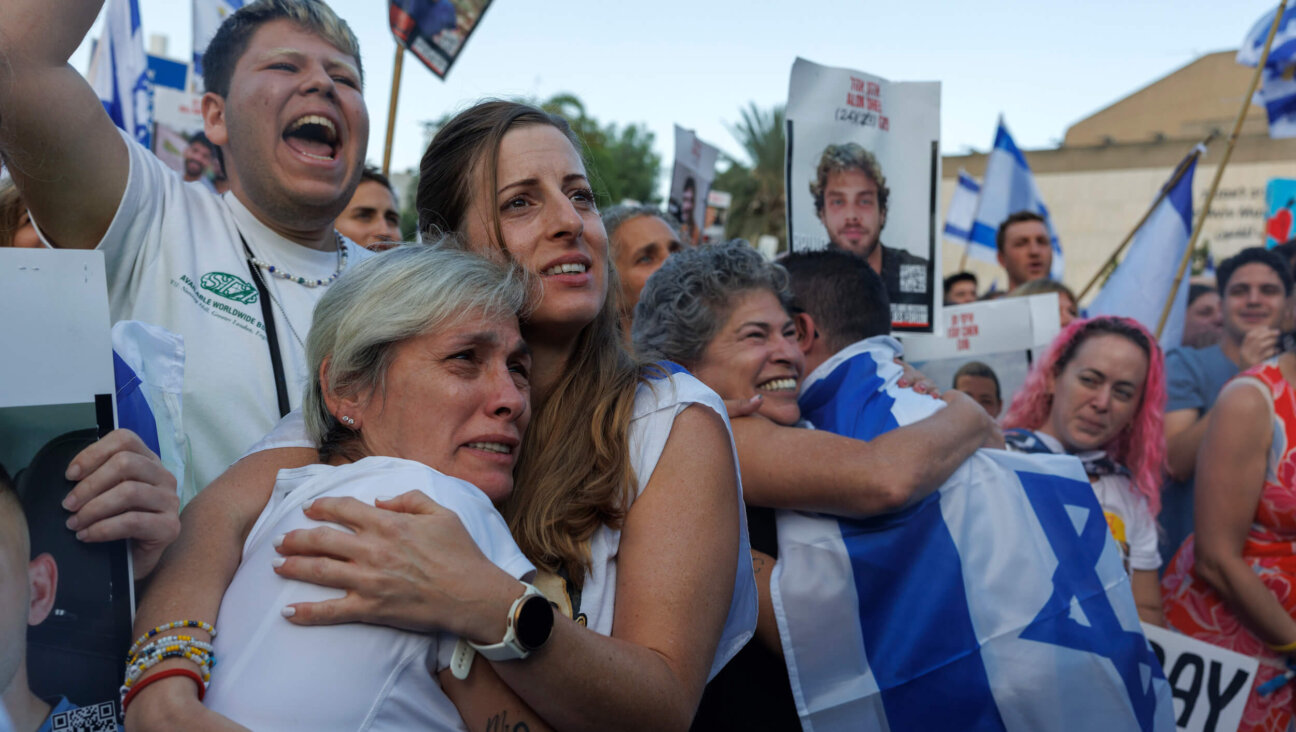Israel Braces for Funeral of Teenage ‘Revenge’ Victim

Image by getty images
(Reuters) — Shelling across the Gaza Strip’s border tapered off on Friday while Israel braced for violent protests by Palestinians in Jerusalem and the occupied West Bank at the funeral of a youth they believe was killed by far-right Jews.
Hostility that had simmered since three Israeli teenagers were abducted on June 12, triggering army sweeps of the West Bank, boiled over this week upon the discovery of their bodies and the Palestinian’s slaying after they were laid to rest.
Surging short-range rocket salvoes from Gaza had drawn Israeli air strikes as well as a mobilization of ground forces which Prime Minister Benjamin Netanyahu on Thursday threatened to use unless the enclave’s dominant Hamas Islamists held fire.
Israel said three rockets were launched at it on Friday, one of which was intercepted by its Iron Dome interceptor. The other two caused no damage. There were no Israeli counter-attacks.
Hamas, whose armed cadres Israel accuses of carrying out some of the rocket strikes this week, said it was in contact with Egyptian mediators trying to prevent further flare-ups.
“Hamas stressed that it was not interested in a confrontation and the occupation (Israel) was responsible for the escalation against our people and they have to stop it,” Hamas spokesman Sami Abu Zuhri said.
Israeli police deployed extra forces in Jerusalem ahead of the funeral on Friday afternoon of Mohammed Abu Khudair, the slain 16-year-old Palestinian. Israel also barred men under the age of 50 from al Aqsa mosque complex, the most important Muslim site in the city.
Cairo, echoing Western powers, has also urged restraint by Israel over the killing of the three Jewish seminary students, which Netanyahu blames on Hamas men in the West Bank who are still at large. Hamas neither confirmed nor denied involvement.
Israelis were incensed at the deaths. Scores of ultra-nationalists went on anti-Arab rampages, scuffling with police. Hours after the three teens’ televised funerals on Tuesday, Abu Khudair was abducted in Jerusalem. His charred body was found in a forest on Wednesday.
RESPONSIBILITY
Abu Khudair’s family and other Palestinians, including President Mahmoud Abbas, said he was the victim of a Jewish vendetta and that Netanyahu’s right-wing government bore responsibility. Netanyahu called the killing “loathsome” and ordered a swift police investigation to find the culprits.
But with Israeli authorities saying they did not yet know whether Abu Khudair was indeed the victim of a hate crime, angered Palestinian protesters clashed with police in Jerusalem’s sweltering summer heat on Wednesday and Thursday.
The Israeli military said it had jailed four soldiers for posting anti-Arab messages on social media. A police spokesman said the force’s cyber-crime unit was also cracking down on racial incitement online, whether by Jewish or Arab citizens.
While vowing to hit Hamas over the three Israeli teenagers’ killings, Netanyahu is reluctant to launch a major operation in Gaza that could upend his already tenuous ties with Abbas after their U.S.-sponsored peace talks collapsed in April when the Palestinian leader agreed a surprise power-share with Hamas.
Yuval Steinitz, a cabinet minister close to Netanyahu, said escalation risked disrupting international efforts to negotiate a curb on Iran’s disputed program ahead of a July 20 deadline.
“We don’t want, possibly, to divert all of the world’s attention to something else now, of all times, from the matter of the Iranian nuclear program, which is the existential threat to Israel – more than terrorism, more than riots,” Steinitz told Israel’s Army Radio on Friday
















